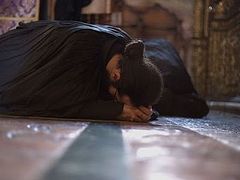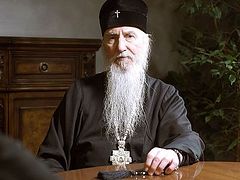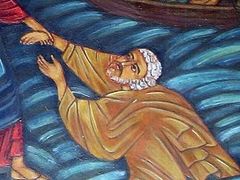Another very important benefit that comes from fasting is courage. When a man fasts, he becomes brave, he acquires courage, which is generally one of the most important virtues in the spiritual battle. If you have no courage, you can’t be saved.
There’s something remarkable in the Patericon, where one ascetic asked his abba:
“Tell me, Abba, how can I be saved?”
And he answered:
“If you have a heart, you can be saved.”
Of course, he didn’t mean a biological heart. If you want something with your heart, if your heart tells you it, and you have courage, you’ll be saved. If you have no courage and you’re fearful, you won’t be saved. You can’t labor and follow God if you’re fearful, because in order to follow God, and to do anything in your life at all, you have to be brave. This applies to marriage too—a fearful man can’t get married. Why are you laughing? You have to be either fearful or clever not to get married. If you don’t have any courage, you’re afraid: “Oh, how am I going to handle this? How will I do it?”—you don’t become a monk, and you don’t do anything else either.
A man must have courage in his soul to be able to fulfill his daily tasks in his life, from the simplest to the most complex, to the most valuable, inasmuch as the most valuable task is salvation. If you have no courage, how will you say no to sin? How can you say no to the daily call of the passions, provocations to temptations, if you don’t learn to acquire this courage and remain steadfast in this “no”? If you’re not steadfast, but rather a reed shaken with the wind (Mt. 11:7), then of course you won’t be able to endure. You’ll fail every time.
Courage is a very strong and important thing; it’s the strength of soul that we have to have. God says the fearful won’t even enter the Kingdom of God (Rev. 21:8). This is described in Revelation: Along with thieves, those who practice magic, and so on, there are also the fearful, because fear is a sign of unbelief. A fearful man has problems with faith. The strong are strong not because they believe in themselves, not because they say: “I’m strong, I’m a hero and I can do anything!” That’s not how it is in the Church, but rather, “I do everything by the strength of God! Yes, I will do everything: I will struggle, fight, die, but through Christ, Who strengthens me—not by myself, not by my own strength, not by myself”—because otherwise they’ll break.
And as the holy Apostle Paul says: I can do all things through Christ Which strengtheneth me (Phil. 4:13). And as Christ says in the Gospel: Without Me ye can do nothing (Jn. 15:5), and also in another place: All things are possible to him that believeth (Mk. 9:23).
When you’re fearful, you don’t have that faith that allows you to say: “By God and faith in God I will overcome obstacles, difficulties, and everything that’s ahead of me.” Isn’t that true?
The Fast comes, and you say: “I can’t. In the morning I’m going to have some coffee, and I want just a drop of milk.” Well, alright. And you add a drop of milk. Okay, but this drop of milk—what, is it nuclear energy? And when you drink it, what, do you become superhuman? What is this? It’s all psychological. Do you really not understand that it’s on psychological grounds?
If you drink a cup of milk, okay, I get it—you’ll get something from it. But this drop of milk that you want to drink in the morning with your coffee or whatever you drink, will it impart some great energy to you? Will it make you bright and vigilant right from the morning? You feel like you’re shaking and your head is spinning? Okay, Great Lent is long, and your head might spin. But does this mean that if you don’t add a drop of milk to your cup now, you’ll your knees will buckle in an hour?
If someone really has a health problem, of course he’ll be more lenient with himself—if he really has problems. But if he doesn’t have a proven health problem, then he’s just afraid of something. What are you afraid of? Man is endowed with many powers, and with hope and faith in God they are multiplied; you’re not dependent on this drop of milk which, of course, doesn’t have the significance that we attach to it.
How can you resist the call of sin, temptation, the passions, if you lack the strength to overcome such a trifle?
But if a man is truly weak, then what do the Fathers of the Church say? They say: “Give your intention to God, and you will receive strength.” Give God your willingness, your will, and God will give you strength. You don’t have the strength—you’re weak. But God is omnipotent, and He’s the source of strength. Give your intention and say: “I want to do this.”
Not like some, who declare in advance: “You know, I’m going to England, and I’m asking for a blessing not to fast!”
Go to England first, and if you don’t fast, tell me about it later. But to give forgiveness of sins in advance? And if you don’t go? You might not go, after all. Something might happen. Is it already certain that you’ll go; is it certain you won’t find any other food, and if there’s nothing else, then you won’t fast?
A man came to me and told me this one day. I answered him:
“Okay, well what’s there to say?... People don’t declare this ahead of time. Go!”
This poor man left. He was supposed to spend a couple of days there. But he fell in with some vegetarians, and it turned out in the end that he never even had any vegetable oil. He had the same salad over and over… But he left with the idea that he was going to England and wouldn’t be fasting.
A man can’t move forward this way. You should say: “I’m going, and I’m going to try to do what I can. I intend to observe the Fast. I intend to keep the law of God. Now. And if it doesn’t work out, if I can’t—that’s another question; we’ll see about that later.”
It’s not a manifestation of courage to predetermine your weakness. Or: “I don’t go there, because they’ll yell at me there.” First go, and then we’ll see if they yell at you. Don’t shed your responsibilities beforehand. Call on God’s help, call on God’s strength, and God will give you strength, if you have the intention to do so. Because God doesn’t leave man alone. God makes a weak man strong.
In the prayer for ordination, we say that “The grace Divine, which always healeth that which is infirm, and completeth that which is wanting.” The grace of God makes up for what’s lacking in man, and strengthens what is infirm and weak in him. Of course, if he wants it. If he doesn’t want it, then nothing can happen. You give your will to God and you’ll receive His strength from Him to accomplish your work.




